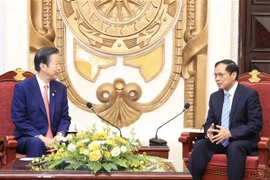The JETRO official noted that in the first seven months ofthis year, Vietnam welcomed 283,668 Japanese visitors, 617 folds higher thanthat in the same period last year. However, compared to the figure recorded inthe same period in 2019 before COVID-19 broke out, the number was equal to only54%.
The new and more favourable visa policy is expected to bringabout positive impacts, especially on Japanese business travelers in Septemberafter Japan’s peak tourism season and on the occasion of the 50th anniversary of the Vietnam-Japan diplomatic relations, he said.
Currently, 460,000 Vietnamese people are working in Japan,accounting for one fourth of the total foreign workforce in the country, henoted, expressing his hope that Vietnam will increase tourism promotion inJapan.
The JETRO Chief Representative said that from September,JETRO plans to organise various events to strengthen bilateral economicpartnership, including a business connection event for Japanese firms andVietnamese startups slated for Hanoi and Ho Chi Minh City in September.
In November, JETRO will hold a “Fast Track” event with theparticipation of leading Vietnamese and Japanese companies who will challengeVietnamese startups, he revealed.
Nobuyuki Matsumoto said that Japanese investors highlyvalues the development potential of the Vietnamese market. However, he pointedto a number of difficulties facing them, including modest industrial landreserve and complicated administrative procedures in work permit issuance.
He advised Vietnam to stably develop industrial parks, whilemaking more efforts in administrative reform, and developing more high-qualityresidential areas for Japanese experts in localities.
Recently, the National Assembly has adopted a law amendingand supplementing some articles of the Law on Exit and Entry of VietnameseCitizens and the Law on Foreigners’ Entry into, Exit from, Transit through andResidence.
Under this law, the e-visa validity period is extended to 90days from 30 days. Within 90 days after the e-visa is granted, foreigners canenter and exit Vietnam for unlimited times and without having to apply for newvisas. The law also permits citizens of the countries entitled to Vietnam’sunilateral visa exemption to be granted a temporary residence period of 45 days,instead of 15 days like in the past, and have visa granting and temporaryresidence extension considered in line with regulations.
On August 14, the Vietnamese Government issued tworesolutions regarding visa exemption and e-visa for foreign citizens. UnderResolution No. 128 amending Resolution No. 32 issued last year, citizensfrom 13 countries could stay in Vietnam for 45 days instead of 15 days sincetheir entry, regardless of passport type or purpose of entry if they meet entryrequirements in line with Vietnam law.
The 13 countries are Germany, France, Italy, Spain, theUK, Russia, Japan, the Republic of Korea, Denmark, Sweden, Norway, Finland andBelarus.
Meanwhile, under Resolution No. 127, citizens from allcountries and territories around the world can use e-visas to enter Vietnam,also from August 15. It also publishes a list of international border gatesthat allow foreign nationals to enter and exit using e-visas./.





























